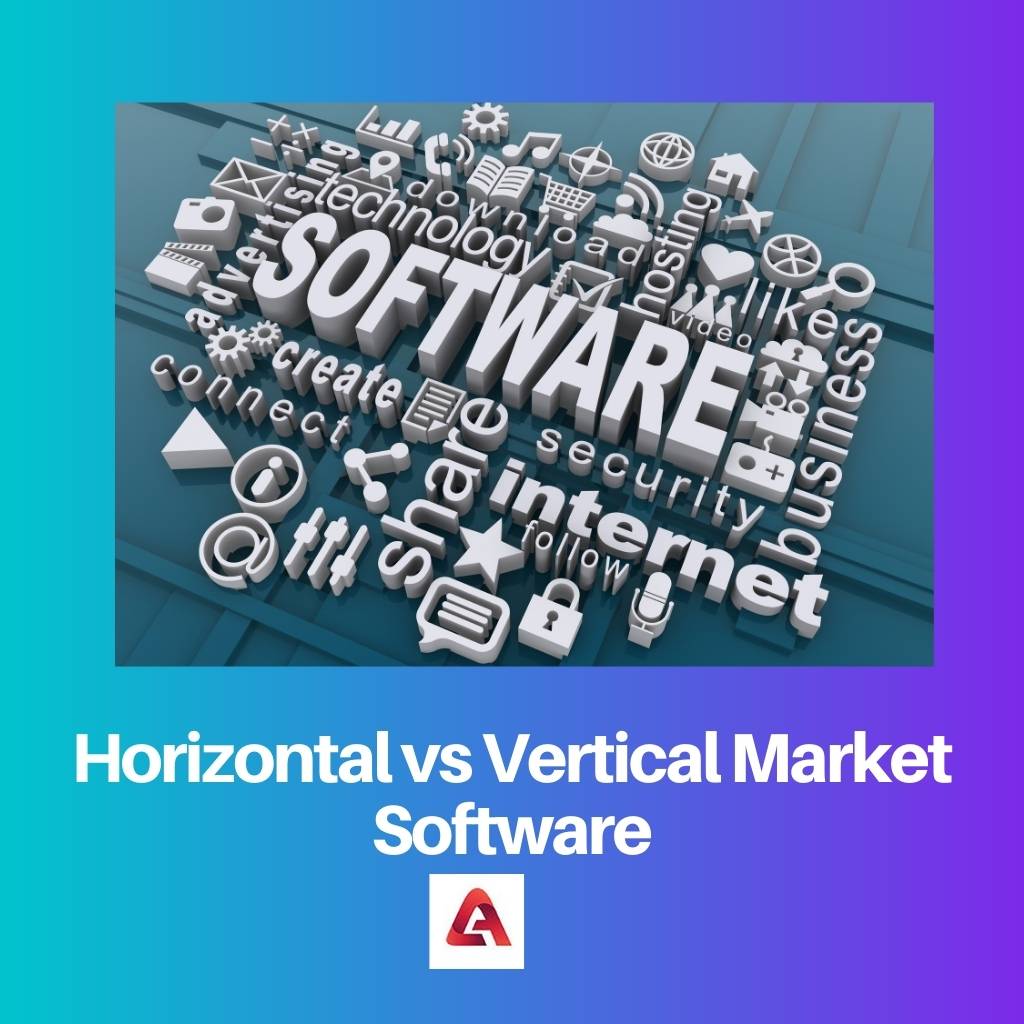Computers use certain application software to complete specific tasks. The extensively utilised software is divided into vertical market software and horizontal market software.
Currently, the majority of e-markets have structures based on vertical market software. The horizontal market, on the other hand, is progressively growing.
Key Takeaways
- Horizontal market software is designed for various industries and applications, while vertical market software is designed for a specific industry or market segment.
- Horizontal market software tends to have broader functionality. It can be used by a wider range of businesses, while vertical market software is more specialized and tailored to the needs of a specific industry.
- Horizontal market software can be used for various purposes, such as accounting or project management. In contrast, vertical market software may be designed for a specific purpose, like healthcare or construction management.
Horizontal vs Vertical Market Software
Horizontal market software is designed to meet the needs of a variety of industries. Vertical market software is designed to meet the needs of specific businesses and industries. Horizontal market software is less specialized and more affordable than vertical market software.

Horizontal market software, or HMS, is a kind of general-purpose software. This software spans nearly all or all of the numerous areas offered on the market. HMS (horizontal market software) covers a wider range of market domains.
Horizontal market software is extremely versatile, and it may be used by a wide range of enterprises and industries. Some examples of HMS or horizontal market software are word processors, spreadsheets and CRM software.
Vertical market software or VMS is industry-specific software. VMS deals with a limited number of distinct sectors in the market. VMS, or vertical market software, focuses on a limited number of domains.
In any other market, the software that belongs to the vertical market software has little or no use. VMS, or vertical market software, can be used to create applications for real estate, finance, retail, insurance, manufacturing, electronics, and transportation.
Comparison Table
| Parameters of Comparison | Horizontal Market Software | Vertical Market Software |
|---|---|---|
| Meaning and definition | The software has a general purpose and cuts through almost all or various domains available in the market. | A software that is industry-specific, which means it deals with only a few and particular domains in the market. |
| Deal with? | A broader variety of market domains. | Few particular domains. |
| Emphasizes on | Utilities, software and electricity, cross-industry boundaries. | Development of applications or niche industry serves clientele’s core group. |
| Flexibility and usage | Highly flexible, other businesses and industries use them. | Almost no use or have limited use in any other market. |
| Examples | CRM software, word processors, spreadsheets. | Real estate, banking, retail, insurance, manufacturing, electronic, transportation programs. |
What is Horizontal Market Software?
Horizontal market software, or HMS, belongs to the family of general-purpose software. It also cuts across practically all or all of the diverse domains accessible on the market. HMS, or horizontal market software, covers a wider range of market domains.
Horizontal market software focuses on broader categories that straddle industry boundaries, such as utilities, software, and power.
This software uses applications of specific technology to automate their day-to-day functions and business processes. They manage their customers better in terms of business relations.
This is what is called a horizontal market approach. The applications they develop can be used in restaurants, banks or insurance firms as well.
The software in the horizontal market software category is quite versatile, and a wide range of enterprises and industries may use it. HMS, or horizontal market software, includes things like CRM software, spreadsheets and word processors.

What is Vertical Market Software?
An industry-specific software is called vertical market software. However, this software deal with some particular and limited domains in the market.
Vertical market software, or VMS, focuses on a limited number of domains. Clientele’s main group is served by vertical market software, which focuses on application development or the speciality industry.
In any other market, the software that belongs to vertical market software has essentially little or restricted application. VMS, or vertical market software, includes real estate, finance, retail, insurance, manufacturing, electronics, and transportation applications.
This software address only a limited amount of providers and clients. Similar methods are used for better marketing strategy by developing similar solutions.
They do not focus on bulk but rather on any one industry. Either telecommunication industry or finance, or even transportation. The reason why a single application can not serve various purposes can be well understood by citing an example.
The software made for banking purposes can not be managed for retail outlet services or in any other industry, as it was specially designed for a particular sector.

Main Differences Between Horizontal and Vertical Market Software
- Software having a general purpose and which cuts through almost all or various domains available in the market belongs to the family of horizontal market software. On the other hand, software that is industry-specific, which means it deals with only a few particular domains in the market, is called vertical market software.
- Horizontal market software, or HMS, deals with a wider variety of market domains. On the other hand, vertical market software or VMS deals with only a few particular domains.
- Horizontal market software emphasizes wider categories, such as utilities, software and electricity, which cross industry boundaries. On the other hand, vertical market software serves the clientele’s core group and emphasizes the development of applications or niche industries.
- The software that belongs to the horizontal market software category is highly flexible, and a variety of businesses and industries can make use of them. On the other hand, the software that belongs to vertical market software has almost no use or has limited use in any other market.
- CRM software, word processors, and spreadsheets are some of the examples of HMS or horizontal market software. On the other hand, applications build for real estate, banking, retail, insurance, manufacturing, electronic, and transportation programs are examples of VMS or vertical market software.

The detailed explanation of horizontal market software and vertical market software is very insightful.
I agree, it’s a very comprehensive overview of both software types.
The details about the applications of horizontal market software and vertical market software are enlightening.
Absolutely! The applications are explained clearly.
I agree, the insight into their uses is very informative.
The explanation of the differences in flexibility and usage between horizontal market software and vertical market software is very informative.
Absolutely, the flexibility and usage aspects are well explained.
Indeed, the article provides a clear understanding of their differences in usage.
This software explanation is very informative
The distinction between horizontal market software and vertical market software based on meaning and definition is very well presented.
The examples provided for both horizontal market software and vertical market software are very useful.
Yes, the examples make it easier to grasp the concepts.
I completely agree, the examples help to understand the differences clearly.
The comparison of horizontal market software and vertical market software is very clear and helpful.
I agree with you, the detailed explanation is very enlightening.
The explanation about horizontal market software and vertical market software is very well structured and informative.
I couldn’t agree more. The article provides a comprehensive understanding of the topic.
The detailed comparison table is helpful in highlighting the differences between horizontal market software and vertical market software.
The distinction between horizontal market software and vertical market software is well articulated.